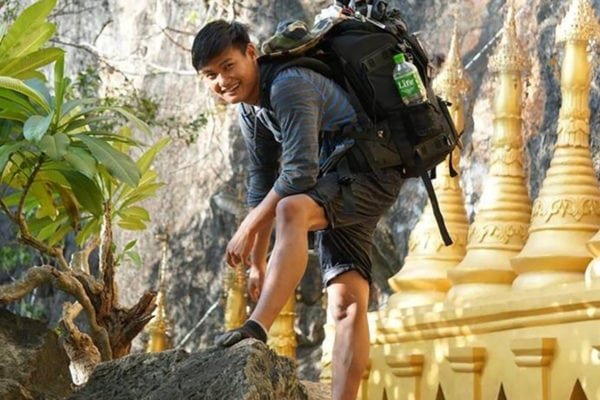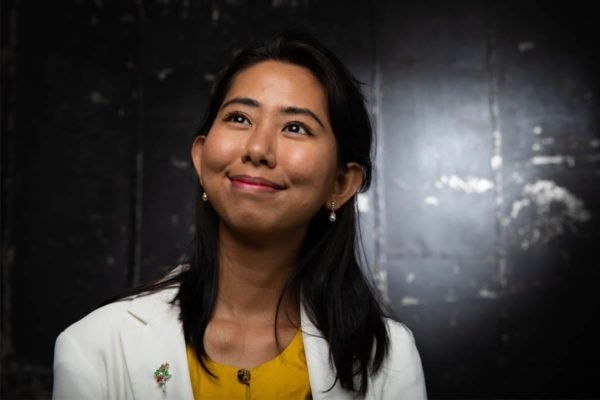Centre students and alumni address Myanmar coup

Myanmar police fired on protesters on Sunday, February 28, making it the bloodiest day in weeks of demonstrations against a military coup. It has been reported (as of this writing) that at least 70 people have been killed, many wounded and hundreds detained.
Myanmar (formerly known as Burma) has been in chaos since the army seized power and detained elected government leader Aung San Suu Kyi and much of her party leadership on Feb. 1, alleging fraud in a November election her party won in a landslide.
The coup, which brought a halt to tentative steps toward democracy after nearly 50 years of military rule, has drawn hundreds of thousands onto the streets and the condemnation of Western countries.
In recent years, Centre has developed an interesting relationship with Myanmar, which has provided the College’s community with international students, undergraduate research and internship opportunities, postgraduate positions and a groundbreaking opportunity for institutional partnerships.
Thet Naing Win ’08 and Thiri “Cynthia” Myat ’08 were the College’s first students from Myanmar, and more recent students from that nation include Khun Nyan Min Htet (Joy Joy) ’17, Eh Nay Thaw ’18, Me Me Khant ’20, Hninn Ei Nandar ’23, and Gloria Lwin ’24.
Leading opposition to the military coup from here in the U.S. include Me Me Khant ’20 and Eh Nay Thaw ’18. Me Me Khant organizes weekly virtual protests from Stanford University, where she is a graduate student in international policy as a Knight-Hennessy Scholar. Eh Nay Thaw has led protests in Washington, D.C., Louisville and St. Paul, Minnesota, since February 6, 2021.
Eh Nay Thaw ’18
“My activism focuses on elevating the voice of ethnic minorities in a supposed democratic society to fight for rights and equal justice,” he says. “In addition, I am working with my colleagues in the U.S. to raise awareness of the atrocities committed by the Tatmadaw (Burma army) in the ethnic control territory.
“I fear that the political turmoil could be used to mask a more intense crackdown on the country’s already oppressed ethnic minorities, who are living in the ethnic territory,” he continues. “I know this very well, because when political turmoil has occurred in the cities, in the mountains the Burma army unleashed the cruelest form of their military doctrine called ‘the four cuts’; indiscriminate killing, burning down villages and terrorizing civilian populations in zones where ethnic armed groups operate. I know this, because they did this to me, my family and my fellow Karen people, forcing us to flee our homeland and eventually seek refuge in foreign countries.” Editor’s note: Eh Nay Thaw spent 10 years in a refuge camp in Thailand before coming to the U.S.
According to Eh Nay Thaw, prior to the coup of February 1, the Tatmadaw were sending more soldiers and supplies to Karen National Union territory in Brigade 3 and Brigade 5. Then in late December and January, the Tatmadaw began shelling several villages and fighting has increased since. They have now attacked deeper into the village areas and forced more than 5300 Karen villagers to flee in the deep jungle without food or medical supply.
“As the Burma army is cracking down on the protesters in the cities, in the mountains they are advancing and killing anyone on sight. Without doubt, the coup only means more bad news for us ethnic minorities. The escalation of military offensives in Karen State in recent months, including in ceasefire areas, is a sign of a worsening humanitarian crisis and a rise in atrocities against ethnic Karen, because minorities like us have been subject to violations including rape, shelling, shooting, looting and burning down villages.”
He says that in response to the coup, the international community has shown expressions of concern for a vague concept of democracy, while ignoring the suffering of ethnic groups for decades under both the National League for Democracy (NLD) and their military rule, as well as the risks posed by climate change.
“Burma faces one of the most severe existential crises in Southeast Asia in terms of the risk posed by climate change,” Eh Nay Thaw says. “We, as a nation, must work together peacefully, democratically and collectively to resolve decades of ethnic, religious and social conflict so we can prepare for a greater challenge—the climate crisis.”
Me Me Khant ’20
Me Me Khant is taking part in formal campaign and advocacy actions, social media activism, briefing the situation to human rights organizations across the world via panels, helping those who are currently on the ground, and fundraising, in addition to weekly protests.

“My activism is to seek greater freedom to all communities in Myanmar and to the fall of the military dictatorship once and for all,” she says. “I think this is true for a lot of our generation fighting on the streets of Myanmar as well. Different people play different roles in this movement, but our goal is to fight for a true federal democratic union and the end of military oppression of all people in Myanmar.
“The news of the military coup on Feb. 1, 2021, was a trigger that invoked generational trauma of living under a totalitarian military regime,” she continues. “Growing up in Myanmar, I experienced first-hand the brutality of the Myanmar military—from witnessing the armed crackdown of the Saffron Revolution to the repression of political dissent.”
Me Me Khant is also deeply concerned for friends and family in her home country.
“Currently, being far away while a revolution unfolds in Myanmar is difficult, as I feel that I am not able to contribute enough to the current struggle, in addition to having to worry about the safety of my loved ones. I was a student union activist before coming to Centre, and a lot of the people who are out on the streets of Yangon protesting are my friends with whom I went to university [she attended a computer engineering university before coming to the U.S.]. So, it is difficult to see violence in Myanmar from afar—especially in the midst of nightly internet shutdowns. Each time, you worry that your friends and loved ones may be the next to get shot or arrested. My mother is a columnist who writes political critiques, and due to her name spreading around on a military warrant list, she has also been in hiding. So, navigating through all of this worry is a challenge.”
She echoes many of the concerns expressed by Eh Nay Thaw in regard to the world’s failure to act on the events unfolding in her country.
“The international community is not always the most effective in their handling of human rights issues,” Me Me Khant says. “Current military coup aside, the international community has largely sat back and watched the ongoing Rohingya genocide. That said, targeted economic sanctions and arms embargoes are beginning to roll out to pressure the Myanmar military, which is to be welcomed. These actions need to continue on a global scale, in addition to pressuring countries such as China, Russia, India, Israel and Ukraine that are major arms suppliers to the Myanmar military. Human rights organizations and international NGOs across the world are trying to stand in solidarity with the people in Myanmar, and the pro-democracy activists and CSOs in Southeast Asia and Hong Kong and Taiwan are also showing their support, which is rather hopeful.”
She says there are important commonalities, as well as differences, in Myanmar’s current crisis and grassroots fights for democracy going on around the world.
“There are a lot of parallels in the sense that we are all fighting with a shared aspiration of democracy and freedom. In Hong Kong, within the region of Southeast Asia and Asia Pacific, the aspiration for democracy and the call for democratic governments are widespread (Thailand and Cambodia would be other examples). In fact, there is communication between Hong Kong activists and protests in Myanmar. Hong Kong activists had shared a protest manual with tips to protect ourselves in violent crackdowns and so forth. Of course, the Myanmar military crackdowns are far more brutal with real live ammunitions and bullets, so there is only so many safety measures we can take. Yet, the support is very encouraging. There is an online alliance called the MilkTeaAlliance between the pro-democracy protestors in Hong Kong, Taiwan, Thailand and Myanmar (sometimes other countries are also included), mobilizing a wave of pro-democracy action across the region.”



